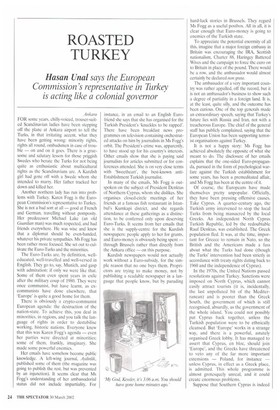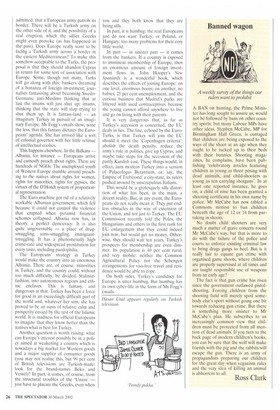ROASTED TURKEY
Hasan Unal says the European
Commission's representative in Turkey is acting like a colonial governor
Ankara FOR some years, chilly-voiced, trouser-suited Scandinavian ladies have been stepping off the plane at Ankara airport to tell the Turks, in that irritating accent, what they have been getting wrong: minority rights, rights all round, ombudsmen in case of trouble — on and on it goes. There is a gruesome and salutary lesson for those priggish Swedes who berate the Turks for not being quite as enthusiastic about multicultural rights as the Scandinavians are. A Kurdish girl had gone off with a Swede whom she intended to marry. Her father tracked her down and killed her.
Another northern lady has run into problems with Turkey. Karen Fogg is the European Commission's representative to Turkey. She is not a bad sort at all — good at French and German. travelling without pomposity. Her predecessor Michael Lake (an old Guardian man) was much respected, and had friends everywhere. He was wise and knew that a diplomat should be even-handed, whatever his private sympathies. Ms Fogg has been rather more focused. She set out to cultivate the Euro-Turks and the minorities.
The Euro-Turks are, by definition, welleducated, well-travelled and well-versed in English. They go to, say, Munich, and gasp with admiration: if only we were like that. Some of them even spent years in exile after the military coup of 1980. They were once communist, but have learnt, as excommunists have done elsewhere, that 'Europe' is quite a good home for them.
There is obviously a crypto-communist European agenda: the destruction of the nation-state. To achieve this, you deal in minorities, in regions, and you talk the language of rights in order to destabilise working, historic nations. Everyone knew that this was Karen Fogg's agenda — even her parties were directed at minorities; some of them, frankly, imaginary. She made some powerful enemies.
Her emails have somehow become public knowledge. A left-wing journal, Aydinlik, published some of them (the magazine was going to publish the rest, but was prevented by an injunction). It seems clear that Ms Fogg's understanding of her ambassadorial status did not include impartiality. For
instance, in an email to an English Eurofriend she says that she has organised for the Turkish President's 'knuckles to be rapped'. There have been breakfast news programmes on television containing orchestrated attacks on him by journalists in Ms Fogg's orbit. The President's crime was, apparently, to have stood up for his country's interests. Other emails show that she is paying said journalists for articles submitted or for conferences attended. She is on very close terms with 'Sweetheart', the best-known antiEstablishment Turkish journalist.
In many of the emails, Ms Fogg is outspoken on the subject of President Denktas of Northern Cyprus, whom she dislikes. She organises closed-circle meetings of her friends at a famous fish restaurant in Istanbul's Kumkapi district, and she regards attendance at these gatherings as a distinction, to be conferred only upon deserving Euro-Turks. It seems from her emails that she is the supply-centre for the Kurdish newspapers: people apply to her for grants, and Euro-money is obviously being spent — through Brussels rather than directly from the Ankara office — on this purpose.
Kurdish newspapers would not actually work without a Euro-subsidy, for the simple reason that no one buys them. Proprietors are trying to make money, not by publishing a readable newspaper in a language that people know, but by parading hard-luck stories in Brussels. They regard Ms Fogg as a useful postbox. All in all, it is clear enough that Euro-money is going to enemies of the Turkish state.
To appreciate the potential enormity of all this, imagine that a major foreign embassy in Britain was encouraging the IRA, Scottish nationalism, Charter 88, Haringey Battered Wives and the campaign to force the euro on to Britain in place of the pound. There would be a row, and the ambassador would almost certainly be declared non grata.
The ambassador of a very important country was rather appalled, off the record, but it is not an ambassador's business to show such a degree of partiality in a foreign land. It is, at the least, quite silly, and the outcome has been curious. One of the top generals made an extraordinary speech, saying that Turkey's future lies with Russia and Iran, not with a treacherous Europe. The chief of the general staff has publicly complained, saying that the European Union has been supporting terrorist organisations against Turkey.
It is not a happy story: Ms Fogg has achieved absolutely the opposite of what she meant to do. The disclosure of her emails explains that the one-sided Euro-propaganda, pursued in the form of psychological warfare against the Turkish establishment for some years, has been a premeditated affair, and Ms Fogg has been at the centre of it.
Of course, the Europeans have made themselves pretty unpopular. Officially, they have been pressing offensive causes. Take Cyprus. A quarter-century ago, the Turkish army intervened to stop the local Turks from being massacred by the local Greeks. An independent North Cyprus Turkish Republic, led by the redoubtable Rauf Denktas, was established. The Greek population fled. It was, at the time, important for Greece to remain in Nato, so the British and the Americans made a fuss about what the Turks had done (though the Turks' intervention had been strictly in accordance with treaty rights dating back to 1960 and the independence of Cyprus).
In the 1970s, the United Nations passed resolutions against Turkey. Sanctions were imposed on North Cyprus, which cannot easily attract tourists (it is, incidentally, the last unpolluted bit of the Mediterranean) and is poorer than the Greek South, the government of which is still recognised, absurdly, as the government of the whole island. You could not possibly put Cyprus back together, unless the Turkish population were to be ethnically cleansed. But 'Europe' works in a strange way, and there is a powerful, astutely organised Greek lobby. It has managed to assert that Cyprus, en bloc, should join 'Europe', and the Greeks have threatened to veto any of the far more important extensions — Poland, for instance — unless Cyprus, in effect as a Greek place, is admitted. This whole programme is almost grotesquely unreal, and it could create enormous problems.
Suppose that Southern Cyprus is indeed admitted; that a European army patrols its border. There will be a Turkish army on the other side of it, and the possibility of a real eruption, which the sillier Greeks might even provoke (as has happened in the past). Does Europe really want to be facing a Turkish army across a border in the eastern Mediterranean? To make this somehow acceptable to the Turks, the proposal is that they should abandon Cyprus in return for some sort of association with Europe. Some, though not many, Turks will go along with this: bankers dreaming of a bonanza of foreign investment; journalists fantasising about becoming SwedoGermans; anti-Muslims thinking that at last the imams will just shut up; imams, thinking that the state will stop trying to shut them up. It is fantasy-land — an imaginary Turkey in pursuit of an imaginary Europe. Ms Fogg's emails show, none the less, that this fantasy dictates the Europeans' agenda. She has arrived like a sort of colonial governor with her little retinue of intellectual coolies.
This happens elsewhere. In the Balkans — Albania, for instance — Europeans arrive and earnestly preach about rights. There are hundreds of NG0s. The unemployed youth of Western Europe stumble around preaching to the natives about rights for women, rights for minorities, rights for gypsies, the virtues of the D'Hondt system of proportional representation.
The Euro machine got rid of a relatively workable Albanian government, which fell because it could not control the violence that erupted when pyramid financial schemes collapsed. Albania now has, in theory, a perfect democracy. It is also quite ungovernable — a place of drugsmuggling, arms-smuggling, immigrantsmuggling. It has a phenomenally high crime-rate and widespread prostitution for every taste, including paedophilia.
The Europeans' strategy in Turkey would make the country into an enormous Albania. There are, of course, minorities in Turkey, and the country could, without too much difficulty, be divided, Stalinistfashion, into autonomous regions and ethnic enclaves. This is fantasy, and dangerous at that. Turkey has been a force for good in an exceedingly difficult part of the world and, whatever her sins, she has proved to be an oasis of relative calm and prosperity envied by the rest of the Islamic world. It is madness for official Europeans to imagine that they know better than the natives what is best for Turkey.
Another question is worth raising: what can Europe's interest possibly be in a policy aimed at weakening a country which is nowadays a big market for Western goods and a major supplier of consumer goods (you may not realise this, but 99 per cent of British televisions are Turkish-made: look for the brand-names Beko and Vestel)? In part, it comes, of course, from the structural troubles of the `Union. — you have to placate the Greeks, even when
you and they both know that they are being silly.
In part, it is humbug: the real Europeans just do not want Turkey, or Poland, or Hungary: too many problems for their cosy little world.
In part — in sinister part — it comes from the bankers. If a country is exposed to imminent membership of Europe, then an enormous amount of foreign investment flows in. John Hooper's New Spaniards is a wonderful book, which describes the effects of joining Europe: on one level, enormous boom; on another, no babies, 25 per cent unemployment, and the curious business that Madrid's parks are littered with used contraceptives because the young cannot afford anywhere to live and go on living with their parents.
It is very dangerous that, as far as Turkey's accession is concerned, the EU deals in lies. The line, echoed by the EuroTurks, is that Turkey will join the EU should it meet the 'Copenhagen criteria': abolish the death penalty, reduce the army's role in politics, give up Cyprus, and maybe take steps for the secession of the partly Kurdish east. These things would, in effect, turn modern Turkey into a version of Palaeologus Byzantium, or, say, the Empire of Trebizond: a city-state, its rulers pushed around by unscrupulous Italians.
This would be a grotesquely silly distortion of what has been. in the main, a decent reality. But, in any event, the Europeans do not really mean it. They put endless obstacles in the way of extension of the Union, and not just to Turkey. The EU Commission recently told the Poles, the Hungarians and others in the first rank for EU enlargement that they could indeed join now, but would get no money. Otherwise, they should wait ten years. Turkey's prospects for membership are even dimmer. Its population is 40 per cent rural, and very mobile: neither the Common Agricultural Policy nor the Schengen arrangements for visa-free travel and residence would be able to cope.
On both sides, Turkey's candidacy for Europe is utter humbug. But humbug has its own cyber-life in the form of Ms Fogg's emails.
Hasan Unal appears regularly on Turkish television.



































































 Previous page
Previous page